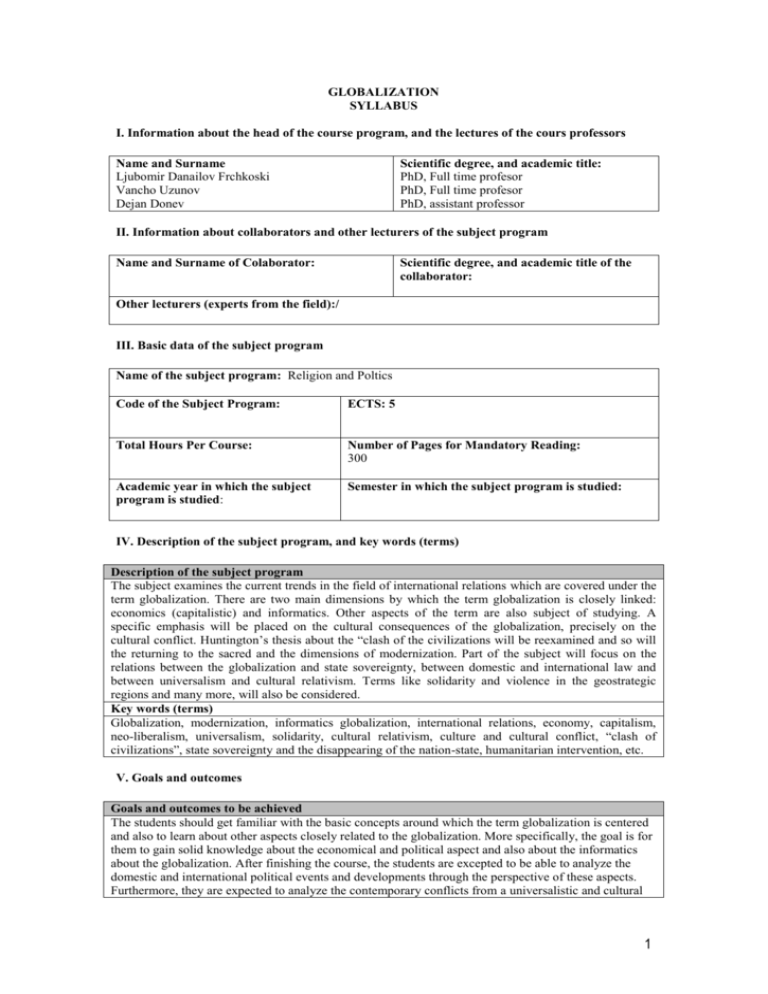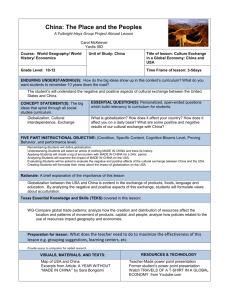
GLOBALIZATION
SYLLABUS
I. Information about the head of the course program, and the lectures of the cours professors
Name and Surname
Ljubomir Danailov Frchkoski
Vancho Uzunov
Dejan Donev
Scientific degree, and academic title:
PhD, Full time profesor
PhD, Full time profesor
PhD, assistant professor
II. Information about collaborators and other lecturers of the subject program
Name and Surname of Colaborator:
Scientific degree, and academic title of the
collaborator:
Other lecturers (experts from the field):/
III. Basic data of the subject program
Name of the subject program: Religion and Poltics
Code of the Subject Program:
ECTS: 5
Total Hours Per Course:
Number of Pages for Mandatory Reading:
300
Academic year in which the subject
program is studied:
Semester in which the subject program is studied:
IV. Description of the subject program, and key words (terms)
Description of the subject program
The subject examines the current trends in the field of international relations which are covered under the
term globalization. There are two main dimensions by which the term globalization is closely linked:
economics (capitalistic) and informatics. Other aspects of the term are also subject of studying. A
specific emphasis will be placed on the cultural consequences of the globalization, precisely on the
cultural conflict. Huntington’s thesis about the “clash of the civilizations will be reexamined and so will
the returning to the sacred and the dimensions of modernization. Part of the subject will focus on the
relations between the globalization and state sovereignty, between domestic and international law and
between universalism and cultural relativism. Terms like solidarity and violence in the geostrategic
regions and many more, will also be considered.
Key words (terms)
Globalization, modernization, informatics globalization, international relations, economy, capitalism,
neo-liberalism, universalism, solidarity, cultural relativism, culture and cultural conflict, “clash of
civilizations”, state sovereignty and the disappearing of the nation-state, humanitarian intervention, etc.
V. Goals and outcomes
Goals and outcomes to be achieved
The students should get familiar with the basic concepts around which the term globalization is centered
and also to learn about other aspects closely related to the globalization. More specifically, the goal is for
them to gain solid knowledge about the economical and political aspect and also about the informatics
about the globalization. After finishing the course, the students are excepted to be able to analyze the
domestic and international political events and developments through the perspective of these aspects.
Furthermore, they are expected to analyze the contemporary conflicts from a universalistic and cultural
1
relativistic standpoint.
VI. Teaching methodology
Teaching methodology
The subject of the course will be taught by using two general approaches: ex-cathedra and interactive
lectures. Additional means, like Power Point presentations, debates and discussions will be used. Modern
methods for systematic and integral learning of the material will be used, in addition to the thorough and
critically-comparative analyses of the material that students are going to do with the interactive help from
their mentors. To this end, individual and group work will be applied.
VII. Detail Curriculum Structure
Week 1
Number of Classes:
Topic:
Mandatory literature:
DEFENITION AND KEY CONCEPTS OF
THE TERM GLOBALIZATION
Вулетић, Владимир. Глобализација. Београд:
Завод за уџбенике, 2009, pр. 38-47.
(or authorised tutorial review for faculty use only)
Detailed structure of the thematic unit:
- globalization as civilization;
- globalization as modernization;
- globalization as spreading capitalism;
- globalization as spreading the flown of financial capitalism;
-popular interpretations;
Week 2
Number of Classes:
topic:
GLOBALIZATION OF WORLD POLITICS
Mandatory literature:
Baylis John, Smith Steve, The Globalization of
World Politics – An Introduction to International
Relations, Oxford University Press, pp.1-31
Detailed structure of the thematic unit:
from international to world politics;
-theories of world politics;
-heralds of globalization;,
-globalization – myth or reality?;
-the meaning of globalization;
-conceptualizing the globalization;
-contemporary globalization;
-transformed world – twisted global politics;
-from twisted global politics to cosmopolite global politics.
Week 3
Number of Classes:
topic:
Mandatory literature:
RIVAL APPROACHES AND THEORIES IN
STUDYING GLOBALIZATION
Вулетић, Владимир. Глобализација. Београд:
Завод за уџбенике, 2009, pр. 11-16.
Vuletic, Vladimir. Globalizacija – Aktuelne debate.
Zrenjanin: Gradska narodna biblioteka, 2006, pp. 2741.
(or authorised tutorial review for faculty use only)
Detailed structure of the thematic unit:
- approaches:
2
а. Globalists;
b. Skeptics;
c. Hyper-globalists;
d. Transformationalists;
e. Anti-globalists .
- theories:
а. Theory of imperialism;
b. Theory of modernization and convergence;
c. Contemporary theories.
Week 4
topic:
DIMENSIONS OF GLOBALIZATION
Number of Classes:
Mandatory literature:
Vuletić, Vladimir. Globalizacija – Aktuelne debate.
Zrenjanin: Gradska narodna biblioteka, 2006, pp. 4287.
Минчева, Бранка. Универзална етика. Скопје:
Макавеј, 2009, pр. 50-65.
Singer, Peter. Jedan svijet: Etika globalizacije.
Zagreb: Ibis, 2005, pp. 1-13.
(or authorised tutorial review for faculty use only)
Detailed structure of the thematic unit:
-economic, political, ecologic, social and cultural dimension;
-philosophical and ethical standings and interpretation of globalization;
-UNESCO project - Universal Ethics – and Hans King’s project – Global Ethics – as philosophical and
ethical postulates and responses to globalization;
-philosophical and ethical challenges of globalization.
Week 5
Number of Classes:
topic:
Mandatory literature:
GLOBAL POLITICAL ECONOMY
Baylis John, Smith Steve, The Globalization of
World Politics – An Introduction to International
Relations, Oxford University Press, pp.212 – 231;
Viotti Paul, Kauppi Mark, International Relations
and World Politics: Security, Economy, Identity,
Pearson Prentice Hall, pp. 351 -381;
Ванчо Узунов, „Глобализација и економски
развој. Теорија и политика“, Правен факултет –
Скопје, (глава 2)
(or authorised tutorial review for faculty use only)
Detailed structure of the thematic unit:
-international political economy in times of globalization;
-economic globalization in the 21 century (the question of neo-liberalism, Bretton-Woods system and the
thought of Joseph Stiglitz).
Week 6
Number of Classes:
topic:
INTERNATIONAL ECONOMIC
INTEGRATIONS AND INTERNATIONAL
TRADE REGULATIONS
Mandatory literature:
Thomas Oatley (2006), “International Political
Economy. Interests and Institutions in the Global
Economy”, 2nd edition, Pearsons Longman, New
York, (Chapter 2)
3
Ирена Кикеркова, „Меѓународна економија“,
Економски факултет – Скопје (глава 2)
(or authorised tutorial review for faculty use only)
Detailed structure of the thematic unit:
Secularisation, Act I: Medieval Origins
Secularisation, Act II: Hobbes’ Sacred Politics
Secularisation, Act III: The Enlightenment
Week 7
Number of Classes:
topic:
Mandatory literature:
POLITICAL ASPECTS OF
GLOBALIZATION
Baylis John, Smith Steve, The Globalization of
World Politics – An Introduction to International
Relations, Oxford University Press, pр.231-249;
287-313;
Detailed structure of the thematic unit:
-international regimes and diplomacy in the globalized world;
-transnational actors and international organizations.
Week 8
Number of Classes:
topic:
Mandatory literature:
NATIONALISM IN A GLOBALIZED
WORLD
Baylis John, Smith Steve, The Globalization of
World Politics – An Introduction to International
Relations, Oxford University Press, pp 359-374;
Detailed structure of the thematic unit:
-concepts and debates;
-nationalism, nation-state and global politics throughout history;
-nationalism, nation-state and contemporary global politics.
Week 9
Number of Classes:
topic:
GLOBALIZATION AND CULTURAL
DIVERSITY
Mandatory literature:
-Vuletic, Vladimir. Globalizacija – Aktuelne debate.
Zrenjanin: Gradska narodna biblioteka, 2006, pp.
212-256. (or authorised tutorial review for faculty
use only)
-Baylis John, Smith Steve, The Globalization of
World Politics – An Introduction to International
Relations, Oxford University Press, pp 374 – 391;
-Samuel F. Huntington, The Clash of Civilizations –
Remaking of World Order, Simon & Schuster
Publisher;
-Norris Pippa and Ronald Inglehart, “Islam and the
West: Testing the Clash of civilization thesis”
Harvard University and the University of Mitchigan
(paper).2002
4
-Gelot, Ludwig “On the Theological Origins and
Character of Secular International Politics: Towards
Post-Secular
Dialogue”
-Thesis
submitted
in
fulfillment of the requirements for the degree of PhD
Department of International Politics,Aberystwyth
University,2009 206-282
Detailed structure of the thematic unit:
-globalization and culture as intrinsic constitutive dimension of globalization;
-homogenization or hybridization of culture; -cultural globalization and four possible directions of
cultural development; -cultural conflict in international relations and the debate about universalism
vs. cultural relativism;
- the importance of cultural belongingness;
-Huntington’s thesis about the clash of civilizations and its validity; - the globalization and the “returning
of the Gods”;
-post-secular dialogue.
Week 10
Number of Classes:
topic:
Mandatory literature:
HUMAN RIGTHS, CULTURAL DIVERSITY
AND THEIR IMPORANCE IN THE
INTERNATIONAL GLOBALIZED WORLD
Baylis John, Smith Steve, The Globalization of
World Politics – An Introduction to International
Relations, Oxford University Press, pp 469-483;
Фрчкоски Д. Љубомир, Меѓународно право за
правата на човекот, Магор, pр.53-69
Detailed structure of the thematic unit:
-liberal understanding of human rights;
-the contemporary agenda;
-political and economic rights;
-the dispute about universalism.
Week 11
Number of Classes:
topic:
THE DEBATE ABOUT HUMANITARIAN
INTERVENTION
Mandatory literature:
Baylis John, Smith Steve, The Globalization of
World Politics – An Introduction to International
Relations, Oxford University Press, pp 391-409.
Detailed structure of the thematic unit:
-arguments pro and con;
-90’s – golden age of humanitarian activism?;
-humanitarian intervention and fight against terrorism.
Week 12
Number of Classes:
topic:
Mandatory literature:
Castells Manuel, “The Power Of Identity, The
Information Age : Economy , Society , Culture” ,
Second Edition Volume Ii, Wiley – Blackwell, Uk,
2010 стр.367-429
RECONFIGURATION OF POLITICS IN THE
GLOBAL INFORMATIC SOCIETY
Detailed structure of the thematic unit:
5
-new media as political arena in the informatics era;
-“informatical” politics in action:
-crises of democracy;
-reconstructing democracy.
VIII. Activities
Activities of external institutions
IX. Literature
Mandatory Literature
-Vuletic, Vladimir. Globalizacija – Aktuelne debata. Zrenjanin: Gradska narodna biblioteka, 2006.
-Вулетић, Владимир. Глобализација. Београд: Завод за уџбенике, 2009.
-Минчева, Бранка. Универзална етика. Скопје: Макавеј, 2009.
- Singer, Peter. Jedan svijet: Etika globalizacije. Zagreb: Ibis, 2005.
- Baylis John, Smith Steve, The Globalization of World Politics – An Introduction to International
Relations, Oxford University Press,
-Samuel F. Huntington, The Clash of Civilizations – Remaking of World Order, Simon & Schuster
Publisher;
-Norris Pippa and Ronald Inglehart, “Islam and the West: Testing the Clash of civilization thesis”
Harvard University and the University of Mitchigan (paper).2002
- Castells Manuel, “The Power Of Identity, The Information Age : Economy, Society Culture”, Second
Edition Volume Ii, Wiley – Blackwell, Uk, 2010 стр.367-429
- Фрчкоски Д. Љубомир, Меѓународно право за правата на човекот, Магор
Additional Literature
-Ritzer, George (ed.). The Blackwell Companion to Globalization. Oxford: Blackwell Publishing, 2007.
-Lechner, Frank & John Boli. The Globalization Reader. Pub Date RoW, 2007.
Additional documentaries, movies and other video materials will be recommended after every week in
reference to the topic being cover during the lecture.
6







